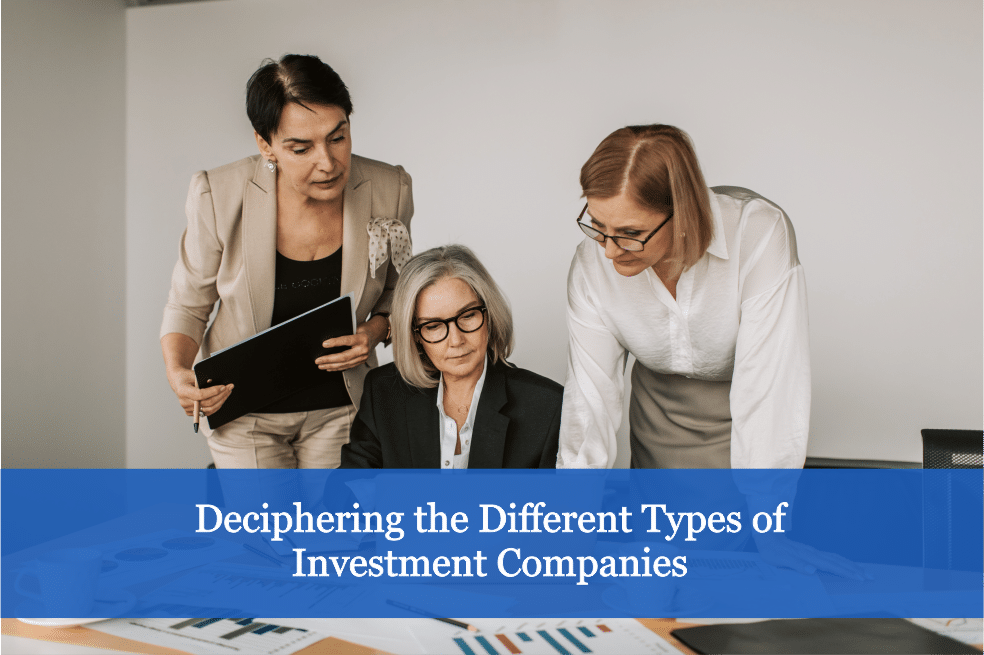In the world of private investment management, investment firms serving high-net-worth (HNW) individuals occupy a distinct role. These firms are structured to meet the complex financial needs of individuals and families with substantial assets, typically beginning at a portfolio benchmark of $500,000 or more. Through strategic asset allocation, risk management, and long-term planning, they help clients preserve and grow wealth across generations.
This page explores the landscape of independent investment firms, the types of services they provide, and how they contribute to broader wealth management goals. Whether you’re exploring options or seeking to compare firms, understanding the function and structure of these organizations can support informed decision-making.

Table of Contents
- What are High-Net-Worth Investment Firms?
- The Essential Services of High-Net-Worth Investment Firms
- Why High-Net-Worth Investment Firms Matter
- Choosing a High-Net-Worth Investment Firm
- Exploring Leading Investment Companies
- Deciphering the Different Types of Investment Companies
- Unveiling the Benefits of Collaborating with Investment Companies
- Essential Tips for Collaborating with Investment Companies
- We’ve Learned About These Seven Reasons to Discount Much of What is Said by Big Banks, Wall Street Firms, and the Media.
What are High-Net-Worth Investment Firms?
High-net-worth investment firms are financial institutions that offer a suite of services designed to manage the wealth of individuals with high net worth—typically those with investable assets of $500,000 or more. These firms come in a variety of forms, ranging from private banks and wealth management divisions of large banks to independent investment firms and family offices. What sets them apart is their focus on serving a wealthy clientele, their familiarity with complex financial landscapes, and their capacity to provide personalized financial planning.

The Essential Services of High-Net-Worth Investment Firms
Investment Management: High-net-worth investment firms are primarily known for their robust investment management capabilities. They have teams of experienced professionals who employ strategies designed to generate returns while managing risk. This often involves allocating assets across a range of vehicles, such as equities, bonds, alternative investments, and real estate, to construct a diversified and balanced portfolio.
Financial Planning: These firms provide comprehensive financial planning services that go beyond investment management. They assist clients in defining their goals and creating strategies to achieve them. Whether it’s preparing for retirement, acquiring real estate, or funding education, plans are tailored to each client’s financial circumstances.
Tax Planning: High-net-worth individuals often face complex tax situations. High-net-worth investment firms typically have tax professionals who can develop tax-efficient investment strategies, help navigate the tax implications of various investment decisions, and plan for estate, gift, and inheritance taxes.
Estate Planning: The preservation of wealth for future generations is a primary concern for many high-net-worth individuals. High-net-worth investment firms work closely with estate attorneys to help clients create an effective estate plan, ensuring the smooth transfer of wealth and minimizing estate taxes.
Risk Management: The management of various risks—investment, liquidity, and personal—is a critical aspect of private investment management. These firms help clients understand their risk tolerance and craft strategies to mitigate risks, including the use of insurance solutions.
Philanthropic Planning: Many high-net-worth individuals are actively involved in philanthropy. Investment firms can assist clients in planning their charitable giving in a manner that aligns with their personal values while also providing tax benefits.

Why High-Net-Worth Investment Firms Matter
High-net-worth investment firms play a pivotal role in managing and safeguarding substantial wealth. Here’s why they are crucial:
Expertise: High-net-worth investment firms have teams of experts with deep knowledge in various aspects of financial management, capable of navigating complex financial landscapes.
Personalization: These firms offer personalized services tailored to the individual needs of each client, understanding that each client’s financial situation, risk tolerance, and long-term goals are unique and require a bespoke approach.
Integrated Approach: High-net-worth investment firms offer an integrated approach to wealth management, addressing all aspects of a client’s financial life, including investments, tax planning, estate strategies, and philanthropy.Long-term Relationship: These firms often build long-term relationships with their clients, providing continuity and a deep understanding of their evolving needs and circumstances.

Choosing a High-Net-Worth Investment Firm
When it comes to choosing a high-net-worth investment firm, there are several factors to consider:
Credentials and Reputation: Look for a firm with a strong reputation in the industry and professionals with relevant credentials, such as Certified Financial Planner (CFP) or Chartered Financial Analyst (CFA). Avoid firms that imply verification without disclosure—use credentials as informational context only.
Services Offered: Ensure the firm offers a full suite of services that meet your needs and can adapt as your financial situation evolves.
Investment Philosophy: Understand the firm’s investment philosophy to ensure it aligns with your risk tolerance and long-term goals.
Fees: Be clear about how the firm charges for its services. Fees can be a flat rate, a percentage of assets under management, or a combination of both. For transparency, consider firms that clearly explain their fee structure, especially if they are fee-based investment advisors.
Communication: Consider how the firm communicates with clients. Regular, transparent communication is critical for staying informed and making decisions confidently.

Exploring Leading Investment Companies
Navigating the complex world of investment firms—especially those recognized for their large assets under management—can be both informative and strategic. However, it’s important to understand that even the most prominent investment companies may not be the right fit for everyone. This is particularly true for high-net-worth individuals whose financial circumstances require tailored solutions that go beyond standard offerings.
Finding the best investment firms for high-net-worth individuals starts with a clear understanding of your own financial landscape. Begin by evaluating your priorities, whether that means planning for retirement, growing business investments, or preserving family wealth across generations.
Next, thorough research into potential investment firms must be conducted. Consider their background, independence, and whether they offer fiduciary-level service—a standard that requires them to act in your best interest.
Be sure the firm provides services that align with your needs, such as tax-efficient strategies, private investment management, and risk mitigation. These capabilities are essential for streamlining complex financial goals.
Review each firm’s compensation structure to identify possible conflicts of interest. Fee-based investment advisors often provide greater transparency compared to commission-based models.
Finally, take time to review client feedback. While individual experiences may vary, testimonials and reviews can offer useful insight into a firm’s service approach and consistency.

Deciphering the Different Types of Investment Companies
Investment companies can be classified into three categories:
Open-end companies have the flexibility to issue shares at any given moment. Investors purchase these shares directly from the fund, allowing for a continuous flow of capital into the fund.
Unit Investment Trusts (UITs) are characterized by a fixed portfolio of securities, typically sold via brokerages. This model allows for a predefined selection of investments, making it easier for investors to understand what they are buying.
Closed-End Funds operate by selling a specified number of shares all at once during an initial public offering. Following this, no new shares are created, and they are listed on a stock exchange, making them similar to individual stocks in their tradability.
Unveiling the Benefits of Collaborating with Investment Companies
Working with investment companies brings a range of benefits derived from the collective capital of multiple investors. This pooled investment approach can provide individual investors with access to a wider array of opportunities, sometimes including asset classes or structures not typically available through individual investing.
One key advantage is access to professional financial insight. Many investment companies employ advisors who help guide investors through the complexities of portfolio management, asset allocation, and long-term planning.
In addition, investment companies often offer exposure across diverse asset classes. This can help streamline private investment management and support portfolio diversification, which may reduce exposure to individual asset risk and support longer-term stability.

Essential Tips for Collaborating with Investment Companies
When choosing an investment company, exercising due diligence is essential. Confirm that the firm is registered with the Securities and Exchange Commission (SEC) or relevant regulatory authorities. This ensures that the firm operates under regulatory oversight and disclosure obligations.
Carefully review the company’s fee structure, including fees associated with securities transactions and advisor compensation models. Understanding how advisors are paid—whether through flat fees, asset-based percentages, or commissions—can help ensure alignment with your financial interests.
While some investors seek advisors who follow a fiduciary standard, it’s important to clarify how the firm defines its obligations and whether any potential conflicts of interest are disclosed.
Finally, take time to evaluate the company’s investment philosophy, the range of securities offered, and the associated risks. Ensuring that these align with your financial goals and risk tolerance will help support informed decision-making in partnership with the right investment firm.

We’ve Learned About These Seven Reasons to Discount Much of What is Said by Big Banks, Wall Street Firms, and the Media.
Lack of Profound Expertise
Most young advisors start their careers at large firms, where training is often designed to support firm profitability rather than independent client outcomes. While professionals at these firms may offer estate or tax-related services, many of these experts operate independently and are not embedded within the firm’s investment division.
Lack of Personalization
Large firms often serve a high volume of clients, making customized financial planning difficult. As a result, many clients are placed in standardized portfolios that may not reflect their specific needs. In contrast, some independent investment firms structure their services to provide greater personalization and adaptability.
Following the Company’s Agenda
Advisors at large institutions may be guided by firm-wide directives or product priorities, which may not always align with individual client objectives. Shifts in personal goals or tax situations may not receive the proactive attention they require.
Conflicts of Interest
Incentives at large firms often involve client acquisition targets or product-specific sales goals. These structures can introduce conflicts of interest that may not fully align with the long-term outcomes high-net-worth individuals seek.
Wall Street Philosophy
The traditional training in large firms tends to emphasize performance metrics without equally accounting for cost efficiency, life event planning, or personalized asset allocation. Success is often measured by returns alone, rather than the alignment of strategy with client-specific goals.
Overemphasis on Diversification
Diversification remains important, but its effectiveness depends on proper asset allocation and alignment with long-term goals. Overdiversification within a narrow asset class—such as equities—without considering other instruments like bonds, cash, or alternatives, may reduce portfolio resilience.
Commission-Based Earnings
Compensation models that rely on commissions from pre-packaged products can create misalignment between the advisor’s recommendations and the client’s best interests. This is why many investors explore fee-based investment advisors and private investment management solutions that prioritize transparent, strategic planning.
While experience is important, the ability to deliver results through long-term planning and strategic asset management often matters more than industry tenure alone. Studies have shown that many active fund managers fail to consistently outperform index funds after taxes and fees are accounted for. Even when performance lags, high fees often persist, eroding overall returns.
The branding and advertising strength of large financial firms may convey authority, but for high-net-worth individuals, the cumulative impact of layered fees and inconsistent strategy can be significant. Strategic wealth planning—rather than active guessing or market timing—remains a critical foundation for sustainable portfolio growth.
A widely cited example is Warren Buffett’s 2007 wager that the S&P 500 Index would outperform a portfolio of actively managed funds over a 10-year period. By 2017, the S&P 500 had outperformed, reinforcing the idea that passive, long-term investing strategies can be highly effective in wealth building. (Buffett donated the proceeds of his bet to charity.)
Frequently Asked Questions
What should I look for in a high net worth investment firm?
You can learn a lot about an investment firm from the information they file with the Securities and Exchange Commission (SEC), which includes a detailed account of their services, compensation structures, and business practices.
How do high net worth investment firms manage wealth preservation and growth?
The key to effective investment management is asset diversification, focused on a broad range of investment options across multiple asset classes. This strategy helps reduce risk and mitigate the effects of market volatility over time.
What should I look for when selecting high net worth investment firms?
When looking for an advisor, you’ll want someone who can help you meet your financial goals. Ask questions about their expertise, experience, and investment philosophy to determine whether their approach aligns with your needs.
What is the importance of portfolio balancing in high net worth investment firms?
Portfolio balancing is the process by which the established levels of risk and return are maintained through asset allocation, which should be reviewed and adjusted regularly—often on a quarterly basis—as markets and personal goals evolve.
What role do financial advisors play in high net worth investment firms?
An investment firm has a staff of financial advisors, who are trained to provide financial services that support clients in achieving their wealth goals—particularly through customized strategies, investment planning, and long-term portfolio management.

